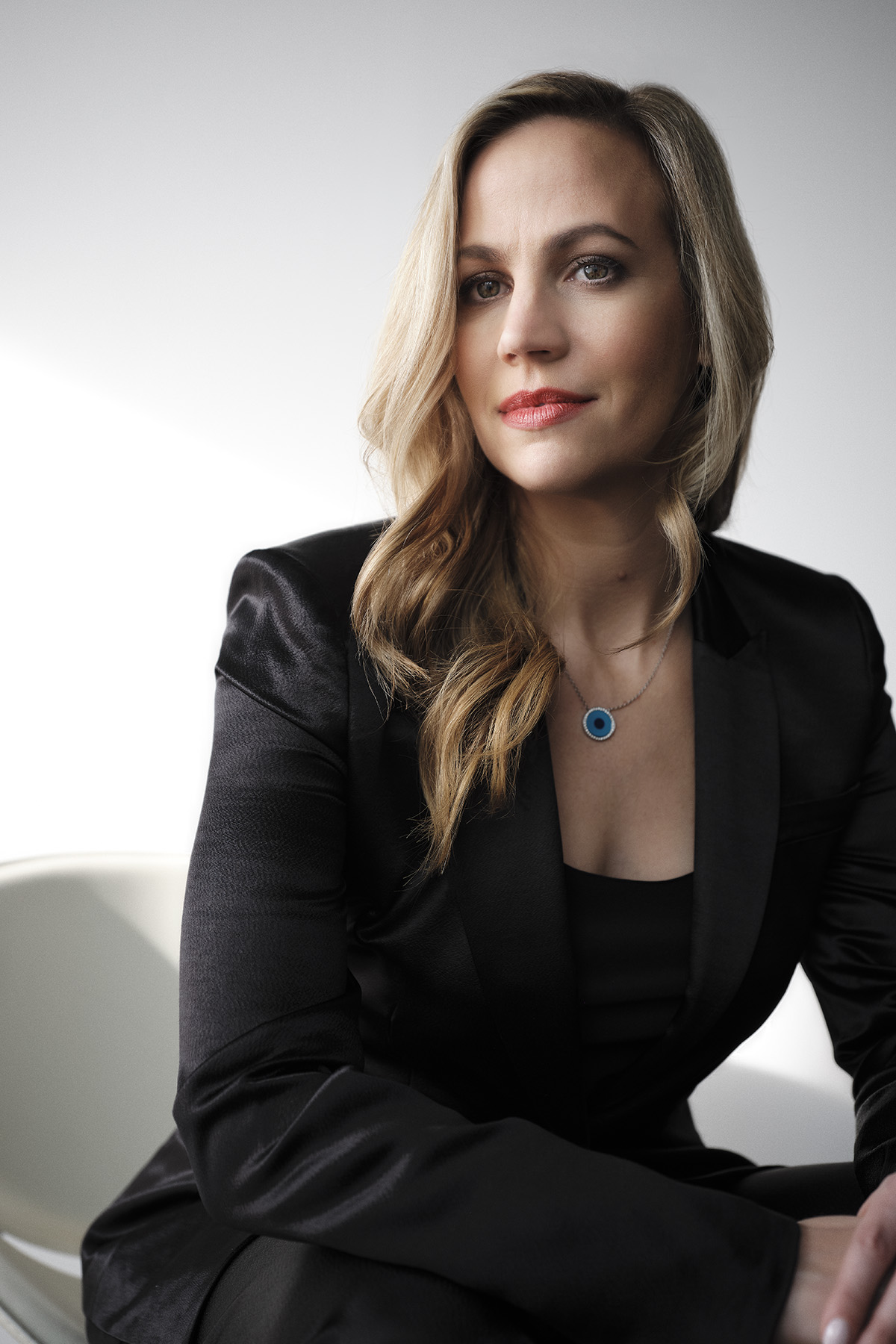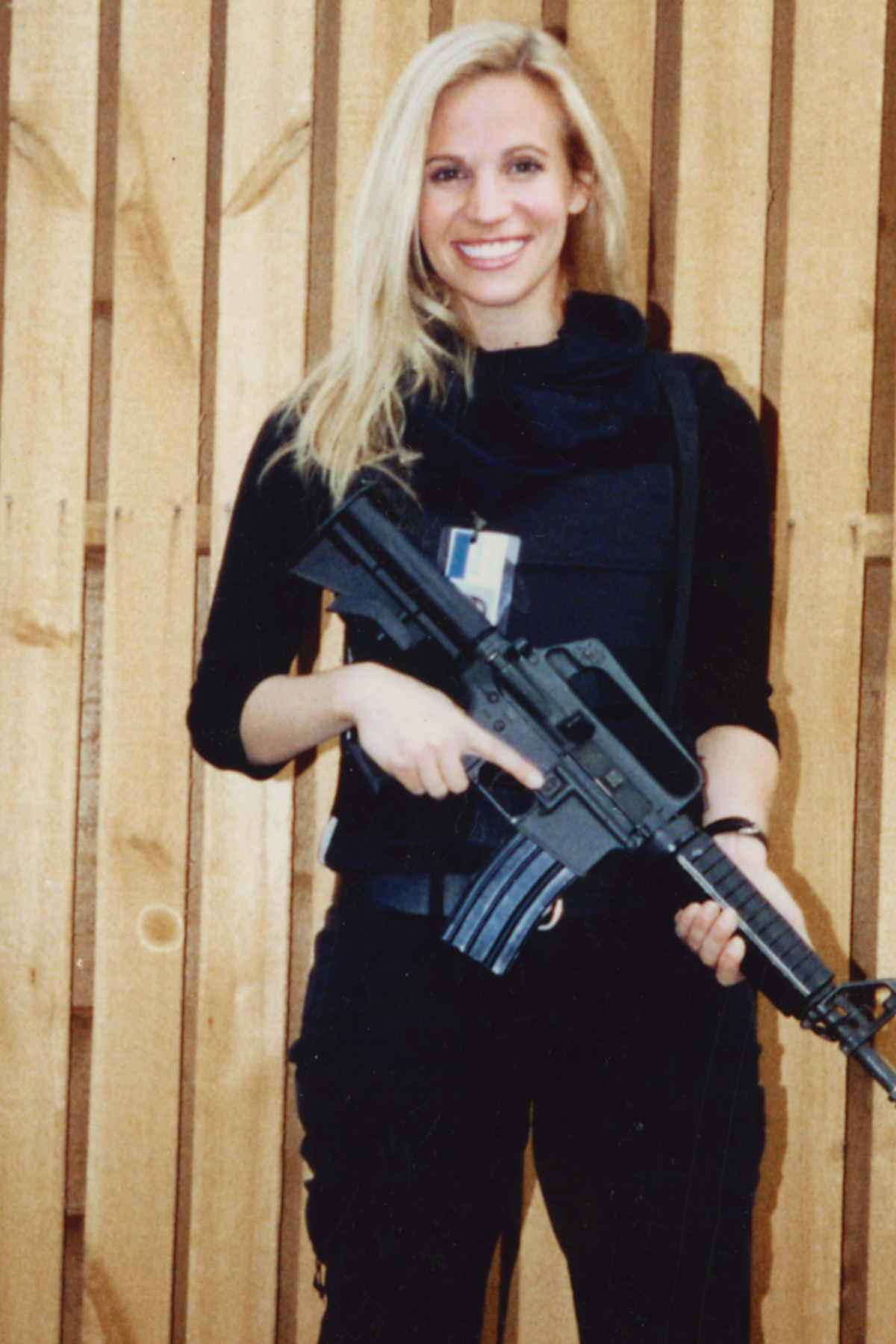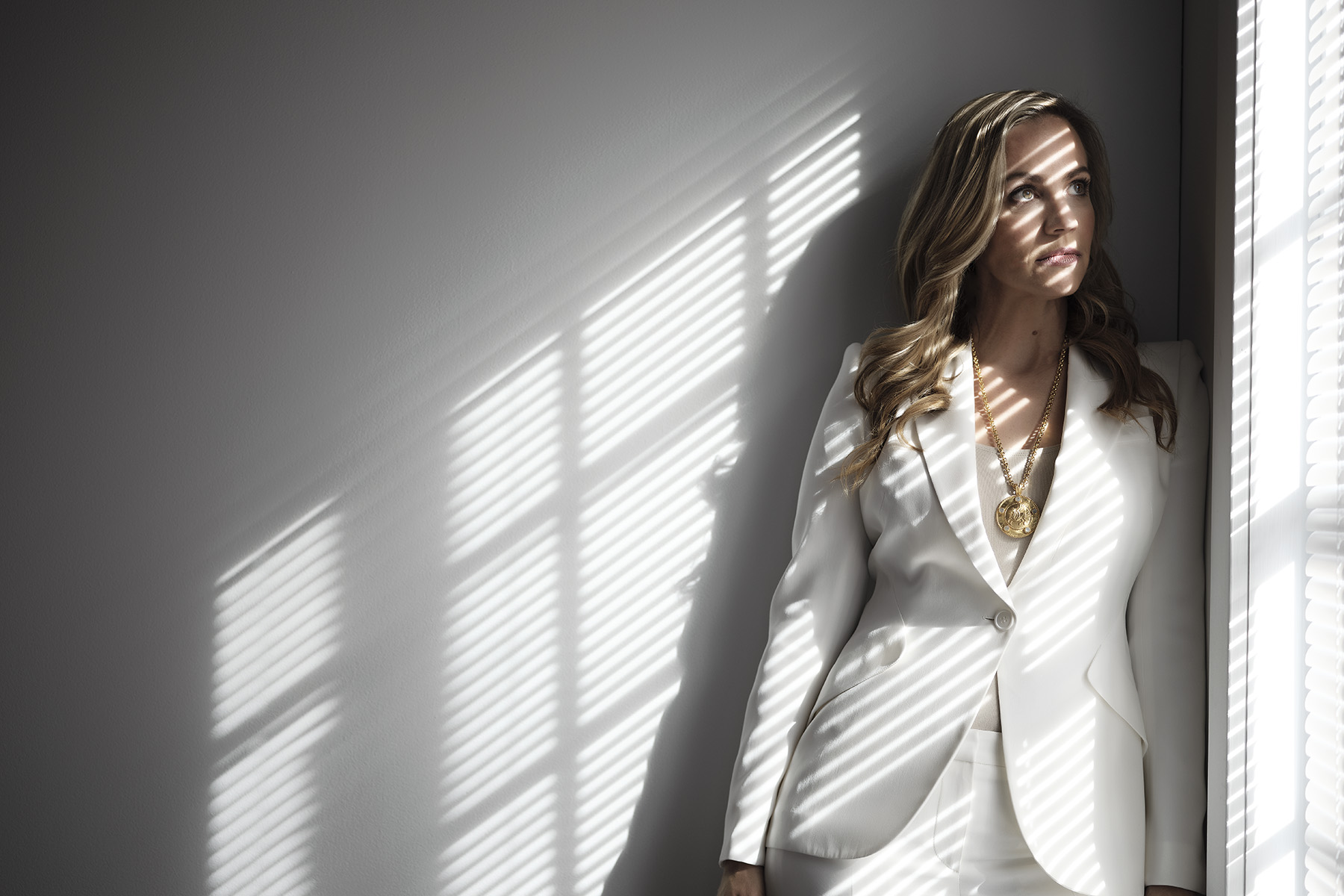Whenever I’ve imagined meeting a spy, I’ve never pictured it happening at a Starbucks in North Dallas, or that the spy would be wearing pink pants and carrying a mint green Yeti tumbler with T-R-A-C-Y spelled out in pink letters on the side. But that’s my fault. I’ve watched too many movies, seen too many trench-coated silhouettes in empty parking garages. Anyway, it’s the spy’s lunch break.
Tracy Walder has met me to talk about her forthcoming memoir, which, in my defense, is titled The Unexpected Spy. She spends much of our interview alternating between telling her story—how she went from a USC sorority house to teaching at Hockaday, by way of the CIA and FBI—and apologizing for it. Instead of periods and paragraph breaks, she punctuates her thoughts by asking if she is rambling on for too long or if she is boring me, protesting that she is not very good at talking about herself. Her writing partner, the novelist Jessica Anya Blau, later confirms this is true.
“I mean, she’s obviously brilliant, but she doesn’t have a sense of what about her is interesting,” Blau says. “So she would say things like, ‘Oh, well, and then the bomb went off,’ and she would talk about something else. And I’d be like, ‘Wait, hold on: what do you mean “the bomb went off”?’ She doesn’t have a sense of her own drama.”
Blau helped guide Walder through that drama—or, more accurately, to that drama—for The Unexpected Spy, which St. Martin’s Press will publish at month’s end. But Blau is not with her now to offer editorial assistance. Neither is Ellen Pompeo, the Grey’s Anatomy star who bought Walder’s story for her Calamity Jane production company right after the book sold and is currently developing it into a series for ABC. So it is up to Walder to explain how a blond Jewish sorority girl from California ended up hunting terrorists in Afghanistan in the immediate aftermath of 9/11, and how that same woman ended up here, teaching at an all-girls school in a city she had no real reason to move to, married to an orthodontist. It’s a LinkedIn page that reads like an episode of The Americans.
But she doesn’t think it’s that exciting. “I’d love it to be a more sexy story” is her shrugging summation of how she came to join the CIA, which involved her delivering a copy of her résumé to a representative from the agency at a college career fair, not a series of coded messages or a clandestine rendezvous. That is Walder’s attitude toward most of her story. Her underselling of her past life is almost comical. At one point, she notes that she was read into a new program in the CIA’s counterterrorism division on September 10, 2001, and the holy-crap coincidence barely warrants a pause from her.

I wonder if maybe working in intelligence gathering—having to be anonymous, forgettable, not a shadow but more like a blur—has sanded her ego to a smooth finish. It wouldn’t have taken much. Walder hasn’t wanted to stand out since she was a gawky high schooler getting teased about her skin and teeth, and then she went into a career where it was a job requirement. Maybe Walder simply doesn’t know how to stand out anymore.
She’s going to have to try. The Unexpected Spy has the kind of advance reviews that usually lead to appearances on bestseller lists, and Pompeo’s involvement in the series will give it every opportunity to succeed. It is time for her to get a sense of her own drama.
“Oh, really? I don’t think that about myself, right?” she says, when I agree with Pompeo that her life sounds like a TV show. “Because you just think that you’re living a life like everyone else is. But, I mean, obviously I’m not.”
Close enough.
Walder never hid what she calls her girly girl side while in the CIA. She never had to. She remembers the CIA as a meritocracy where nothing mattered apart from the work. So the only personal item she took to the Middle East war zone in which she was stationed was a pink reading lamp. (Pink has always been her favorite color.) And while there, she still put on mascara every day, even though she was wearing cargo pants and combat boots. Part of it was self-preservation. “No matter how far away I went in the world,” she writes in her book, “I needed to hold on to the sorority girl in me—I needed to believe that she, I, could survive all this.”
But she’d long had proof of that. Born Tracy Schandler to a psychology professor father and stay-at-home mom in Van Nuys, California, she was diagnosed with hypotonia when she was around 5 months old and clearly lagging behind other babies. Known as “floppy baby syndrome,” the condition is sometimes a symptom of cerebral palsy or muscular dystrophy, and several specialists told her parents that she might never walk correctly. But by 2 she was walking, and soon after that dancing, and that early diagnosis became nothing more than motivation. “I was like an engine that wouldn’t shut down,” she writes.
Most of it was internal combustion. She was called “Zidiot” in high school, a portmanteau of zit and idiot, and tended not to trust anyone outside of her family. She felt out of step, as her classmates’ version of current events was who was dating whom, not the Oklahoma City bombing and what that meant for other governmental buildings. She pledged Delta Gamma at USC, partially as a way to disappear. “The sorority was a place where I wouldn’t stand out … as anything,” she writes. “In the DG house I felt relatively unnoticed. And for me, to be unnoticed was a gift.”
Being a Delta Gamma gave her more than experience at hiding in plain sight. It was in the house’s gym/TV room where she saw Peter Bergen’s 1997 CNN interview with Osama Bin Laden. As he talked about his jihad against American Jews, the United States, and any Americans in Arab countries, Walder decided to become a teacher, to help kids “understand what was happening in the world and their, our, place in it all.” Her plan: to “effect change through policy, politics … op-ed pieces in the New York Times.”
She was on her way toward that goal. She interned in the office of then Democratic minority leader Sen. Tom Daschle and had been told that a full-time job was waiting for her upon graduation. But, of course, she would find a much more hands-on role in effecting change.
“I remember asking, because I’m so naive, ‘I won’t have to kill anyone, will I?’
There is a good chance that Walder is the only person recruited by the CIA while wearing a pink shirt and flip-flops and pushing a purple Huffy bike. She writes that until the recruiter asked if she wanted to join the agency, in the fall of 1999, she never imagined the possibility, though she thought about terrorism constantly. She couldn’t drive stick shift. She had never touched a gun, much less shot one. She was the floppy baby. How could she be in the CIA? But just knowing they saw her as a viable candidate helped her see it for herself.
After joining the agency, she was assigned to the counterterrorism department, “which is really where they put all the new people,” she says, aiming a pushpin at her balloon again. “Because all the seasoned people wanted to be either in the counternarcotics center—which was, like, Latin America was the hot area—or Russia.”
A year later, and a week before 9/11, Walder was approved for a different security clearance in advance of moving into a deeply classified operation—the name of which is still redacted in her book—where she would watch terrorists and their training camps from a place she calls The Vault. She couldn’t even tell her colleagues or her boyfriend at the time, who was also in the CIA, of the existence of The Vault, or what she did there.
“I remember asking, because I’m so naive, ‘I won’t have to kill anyone, will I?’ And I remember the guy saying, ‘Not unless there’s an attack.’ ”
I don’t want to give away too much of what happened next, because it is the heart of The Unexpected Spy, and Walder and Blau went to great lengths to get as much of it on the page as possible. Walder read every existing CIA memoir so she could see what the agency had previously allowed to be published and defend herself when she submitted her manuscript for approval. Even then it took three tries.
“The first time we turned it in, I don’t even know how many pages were redacted,” Blau says, “but two entire chapters were just blacked out with like—there would be one word left. Like the word ‘eat.’ It was hilarious.” After it was finally approved, they decided to publish with the redacted parts blacked out instead of removed entirely, a flourish that adds a bit of intrigue.
Here is what I will tell you: she met President George W. Bush and every relevant member of his administration while in The Vault, poring over satellite images from Afghanistan. Then CIA director George Tenet brought her Thanksgiving dinner directly from his own table.

She chased down terror plots, hatched by people like Abu Musab al-Zarqawi, through Europe and North Africa. Foreign operatives derisively called her Malibu Barbie.
She watched on TV as Secretary of State Colin Powell addressed the United Nations to rally support for the invasion of Iraq and held up a chart she’d made. It listed names and locations of terrorist leaders, none of whom were connected with Saddam Hussein, and was titled “Terrorist Chart.” When Powell held it up, it had been changed to read “Iraqi-Linked Terrorist Chart.”
And she had a chance encounter with the wife of another agent that stirred something in her. “I realized I wanted to feel enclosed by something more intimate than the agency.” She wanted a husband, a family, but she didn’t want it the way it would have to be done in the CIA, with the security measures it would take, the secrecy, the travel, the instability. But she also didn’t want to give up on the fight against terrorism. Eventually, in 2004, that led her to the FBI.
“I love the agency, but the core of what it was was never going to change: the constant traveling; not having a family; the divorce rate is really high,” she says. “Even though I was 25 and I didn’t want to get married yet, I was thinking about what I wanted out of my life. I loved counterterrorism. Like loved counterterrorism. So I left something that I loved. I thought, OK, I can do counterterrorism, but on the home side and become a special agent of the FBI.”
Walder resigned from the CIA in May, and two days later, she started training at the FBI’s academy in Quantico, Virginia. That is when everything went to hell—and also led her here.
“Far as I know, I’m the only female on the op side of the CIA in years, a special agent like that, to go from agency to agency,” Walder says. “If anything, you’ll see analysts, which is not to diminish them. It’s just unusual. Highly unusual.”
Maybe there is a reason, because her choice to join the FBI was a disaster from the start. For one thing: few of her fellow trainees at Quantico believed that she had been in the CIA, and those who did thought that maybe she had been a secretary. The agents in charge of her training were also skeptical. More alarming: misogyny was rampant, she says, even among the small cohort of women.
“At the academy, you have a session where you’re training how to do interviews, right? They ask you to put on a suit. Fine. I put on a suit. And I don’t dress like I’m a stripper. I remember my head teacher pulling me aside saying, ‘You know what? You made the male instructors really uncomfortable, so you’re going to need to buy a suit three sizes too big.’ The CIA never had a problem. When I briefed the president, this wasn’t a problem. Why is this a problem now?”
For a while, I jokingly considered the possibility that maybe Walder hadn’t actually left the CIA, that everything since then had been an elaborate ruse. Why else would someone leave all that behind?
She says now that she should have just quit. But she thought that once she made it through and became an actual agent, the situation would improve. Especially since she was assigned to work counterintelligence out of the Los Angeles office, in the Santa Ana Resident Agency, 10 minutes away from her parents and, to her, in almost every way, a dream assignment. Exactly what she wanted to do, exactly where she wanted to do it.
But in Los Angeles, it was just more of the same. “When I got to the office, Friday was jeans day or whatever, so I would wear jeans, and the head admin person sent an email saying that because I made people feel uncomfortable in my jeans, they were taking away jeans day. Singled me out.”
She says she’s proud of the work she did in the FBI, including help take down a Chinese spy ring as part of one of the agency’s biggest counterintelligence cases. But, as she writes in her book, “throughout my time in the bureau, I couldn’t help but note that my skills and talents weren’t being properly utilized. I was The Girl in the eyes of the agency, and everything I was asked to do reflected that. … When there were children involved, I was the girl who babysat. Where there was a wife, daughter, or mother involved, I was the girl who would be their friend.”
She quit after 15 months.
It was the end of Walder’s career as a spy, but it was just the beginning of a new mission, one that had been interrupted by that CIA recruiter. She was ready to teach the young women who might one day follow her.
For a while, I jokingly considered the possibility that maybe Walder hadn’t actually left the CIA, that everything since then had been an elaborate ruse. Why else would someone leave all that behind? Kids dream of being spies, not history teachers, of foreign adventure, not solid marriages to orthodontists.
It’s clear, however, as we talk that teaching is where her passion lies. This is her dream; she speaks about the CIA and FBI like you would any job. She wrote the book on the advice of her husband, Ben, who thought others might be interested in the stories she told him. (She says he hasn’t actually read it yet and is waiting for the audio version.)
But I get the feeling she might have done it just for the last chapter, which takes place at Hockaday and refers to her pupils as her “revolution.”
Through the foreign affairs course she designed and her work on the board of nonprofit Girl Security, she’s trying to encourage young women to pursue careers in government and intelligence, but also just to pay attention to the events around them, to get involved, to change the world in whatever way they can. Her Hockaday students talk about how they’ve grown in confidence through her course, how her example has helped them see themselves in a way they might not have thought possible before, just like that CIA recruiter did for her.
The revolution will one day extend to her daughter, now 4. For now, she has inherited at least one aspect of her mother’s personality. Walder took her daughter to the International Spy Museum in Washington, D.C., over the summer. At first, she didn’t want to go in. She told her mom, “It’s not fancy enough.”







